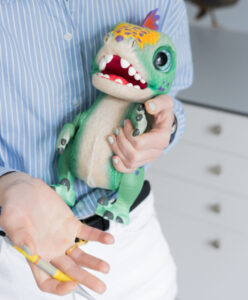At what age do children need annual preventive screening?
Preventive screening is required for all children attending educational institutions – kindergartens and schools. So the age varies widely – from 1 year old to 18-19 years of age at the end of school.
A dental check-up before starting school or returning after the summer holidays is compulsory, as is a visit to the family doctor. After the dental assessment, we issue electronic dental health certificates: we make a record that is valid for one year from the date of completion.
Is it really necessary to have such a preventive dental check-up once a year?
Absolutely. The benefits are many, because not only do we tell whether there are damaged teeth or not, but we also assess the child’s oral hygiene, overall oral health and bite.
Maybe there is a need for a better cleaning somewhere, or to start cleaning the child’s crotch, maybe there is a need for some kind of silent treatment, or maybe we should see an orthodontist, a myofunctional therapist. We look at all these things and educate parents.
So the benefits for the family are great! I always see my patients every 6 months to see how things are going, to spot the “bad” things early. For me a year is too long.
Often after a year, when I meet the child, I find something that is already in need of treatment. If there is a very bad situation in the mouth, bad hygiene habits or something I leave to be observed, I even invite the child to visit the paediatric dentist’s office every 3-4 months to start with.
For some children, even a preventive visit to the dentist, during which, according to their parents, “they won’t do anything to you”, is stressful. How to prepare for this visit?

Telling your child about what will happen during the examination will do just that and should be avoided. Even if all the teeth are healthy, the dentist will still carry out some manipulations that the child needs to know about in advance to make him or her feel at ease.
After all, sitting in the dentist’s office, all excited and unaware of what the doctor is doing in his mouth with those strange instruments, can really cause anxiety. So tell your child as much as possible about the visit: where they are going and who they are seeing, explaining that they will be examined using a special mirror with a brighter light, and that they will have their dental health checked or their teeth counted.
Preparation also depends on the age of the child. While a teenager can just be told that he or she is going to have his or her teeth checked, a kindergartener will need to be told more, to play with the patient and the doctor at home, to read books or watch videos.
In general, the preparation for a visit to the dentist depends very much on the child’s personality. Pay attention to how the child receives the information best – whether verbal explanations are enough or whether they need a visual demonstration of how things work. You can even watch videos of the dental check-up. Seeing it from the side will definitely not be so scary, so uncomfortable.
What are the most common dental problems in children and adolescents that you encounter/notice during your visit/check-up?
For the very youngest children, tooth decay in the front teeth. For the slightly older ones, when the deciduous molars come together, interdental caries. If the cleaning stage is missed, the decay is harder to see in the mouth and comes after extensive damage has already occurred. In pre-school and primary school children, failure to apply silants in time also often results in the first lesions in the permanent molars. Not all parents are aware of the availability of free fillings in the clinics where they live.
Teenagers’ problems are not (re)cleaning their teeth and tooth decay in permanent teeth. During adolescence, the second molars are erupting and they are really hard to reach. I have to deal with the fact that before they are even fully erupted, caries are already visible. Again, it is important to have timely silantation and eduction, and how and with what to clean the teeth.
I have given a brief overview of the main problems that I am dealing with, but it is also necessary to keep an eye out for bad habits (whether the soother is not used for too long, whether the finger is not sucked, how the breathing is done – through the nose or the mouth, how the tongue is held …). Our job is to spot it in time, inform the parents and point them in the right direction or send them to a specialist who can help.
If you have unanswered questions, if you have children’s dental problems, and if you want your child to feel comfortable during the dental check-up – paediatric dentists will be waiting for you at the Denticija clinics.
